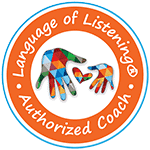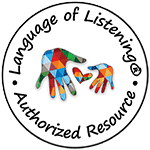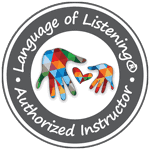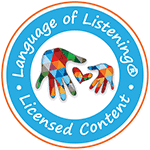Inside: Learn two important words that can help tame temper tantrums in length and intensity. Plus, how the toddler brain works and why tantrums happen.
This morning my 2-year-old daughter asked me for a banana. I nodded. I grabbed the banana. I started peeling. Then like a parenting rookie, I made a terrible mistake.
In order to give her a smaller portion of the banana, I broke it in half.
Devastating.
Tears instantly gushed from her eyes like a dam broke, and I stood there holding a half banana in each hand—dumbfounded. She opened her mouth wide, tilted her head back and I knew the real blow was coming.

Her high pitched screeching zapped my brain into flight or fight mode, and immediately, I tried to “glue” the banana back together, which is code for…I tried to mush it back together (and failed miserably).
Between screeches, she wailed to me.
“It’s bwooooken. And mush-eeeee.”
My head spun as I attempted to give myself a parenting pep talk: fix the banana, yell at her to stop crying, okay fine…hide in the closet, no that’s ridiculous…buck up you sissy! and take on this 2-year-old like you own the place!
So I totally did.
Except not in the way you think.
The toddler brain is an interesting thing.
Did you know that from birth to age three your child’s brain generates 1 MILLION new neural connections a second? (It was previously thought to be 700 new connections a second).
This is staggering amount of brain wiring in a very short period of time.
When you think about it like that, it makes so much sense why a “broken” banana would motivate a 2-year-old to create a river out of tears.
She’s in the middle of a deep, winding and weaving process that grows brain connections for…
- Relationship-building.
- Self-control.
- Problem-solving.
- Communication.
From a logical perspective, and when you’re not listening to high-pitched screaming that rivals an out-of-tune Mariah Carey, it’s so cool. Right?
But then you return to reality and hear the screaming. It comes out of nowhere. It’s frustrating. And if I’m being brutally honest, it’s also ridiculously annoying.
You want a solution. You need something that will shorten the duration of screaming, and hopefully, minimize the loudness too. There is no magic button to turn off a temper tantrum. But there are two words that can dramatically shorten a temper tantrum.
Related: 2 Year-Old Sleep Schedule That Helps Everyone Get More Sleep
How to tame a temper tantrum.
More than anything, kids want to feel heard and understood. One of the principles of Language of Listening®, the 3-part parenting framework that I use, is that kids will continue to communicate until they feel heard.
This is the exact reason your kids pull at your leg whining, “mom. mom. Mom. MOM. MOOOOMMMMM,” until you acknowledge and respond about the tiny leaf crunched between their fingers.
They can’t stop telling you about something until they know that you get it.

At the end of the day, it always comes down to what the child’s wants mattering to someone. Your child desperately wants you to understand his or her wants.
That’s kids (and humans) in a nutshell.
So here’s what you say.
As my daughter wailed over her broken banana – “It’s bwooooken. And mush-eeeee.” – I took a deep breath and remembered two important words from my Language of Listening® training.
“You want…”
Honest. Two words. “You wanted…”
“You wanted the banana whole. And now it’s two pieces. It’s broken AND mushy!”
I repeated myself several more times, waiting for her brain to register.
“Of course, you wanted the banana whole! And now it’s in two pieces! That’s not what you wanted.”
And then she did what she often does after hearing her wants validated.
She took a deep breath. Nodded. Wiped her eyes.
She looked at the banana one more time...and cried. Because that’s what toddlers do. They oscillate from an overactive emotional brain as they work to build more neurons and gain self-control.
It’s what makes parenting babies, toddlers and preschoolers incredibly challenging. It’s hard work supporting your child through this enormous stretch of brain development.
It requires extraordinary patience.
But here’s the good news.
Each time your child dives into a temper tantrum, all you need to remember are two simple words: You want..
“You wanted to play with that toy.”
“You wanted that cookie.”
“You wanted to ride your bike.”
“You wanted to play with your friend.”
The more your child believes you, the more effective your words. (In the past I referred to this as “matching the intensity.”) You’ll notice your child might oscillate between their upset and hearing your words. This is so normal.
It’s not about logic. In fact, it’s about as far from logical reasoning as you can get. Validating your child’s want is about meeting her where she is in the moment – deep in her emotional brain trying to build neurons – learning how to develop relationships, communication, self-control and problem solving skills.
It might start with validating an upset over a broken banana, but 15, 20, or 30 years down the road it’s knowing that what you want matters…even if you can’t have it right away.

Print this free toddler listening checklist.
This post comes with a free printable checklist to help with toddler listening. I always have the hardest time remembering these phrases. This printable simplifies it!
Here is a sneak preview…
Download Your Free Printable
- Download the checklist. You’ll get the printable, plus join 37,000+ parents who receive my weekly parenting tips and ideas!
- Print. Any paper will do the trick, but card stock
would be ideal.
- Place it on your refrigerator. Check things off as you go and don’t forget a thing!
Want more on parenting?
- 2-Year-Old Not Listening? Try This Remarkable Tip
- This Playful Parenting Game Is the Best Way to End Power Struggles
- How to Get Your Kids to Follow a Routine Without Reminders
- One Genius Phrase to Try When Your Kid Says, “I Can’t.”
I've created a free email series just for you! If you are struggling with teaching your child to listen, this series will help transform your parenting. Yes, really. I've seen my proven strategies work time and time again for parents. I know it can work for you too.
After taking my free email series, you will:
- Learn simple, yet highly effective listening strategies
- Experience a stronger connection with your child
- Enjoy more peaceful parenting days
- Gain more cooperation from your child














I would consider it a math lesson. ” no hun, don’t cry. Mommy wanted to show you that if you break one banana in two…you have two halves! Ta da….!”
I try this all the time and believe in this, but with my three year old son, it has NEVER worked fro the time he was 1.5 until still (now almost 3.5). The more I repeat what he is wanting, the more hysterical and upset he gets.
Any thoughts?
I have this same issue with my son. The more I validate his feelings, the more he screams at me. Even after he has calmed down if I bring it up to praise him on calming down, he will start screaming again.
Kids don’t just need validation, they need boundaries, too. In a comment above, the author described how to explain to the child that if they are not going to stop throwing a fit, they need to do it elsewhere until they calm down. I am all about teaching children to recognize their emotions, and giving them *some* choices to meet their need for power and control, but we need to remember that *we* are the parents and *we* set the rules and consequences. I’m sure this writer agrees, we need to not treat our children like the household revolves around them, because that does not prepare them for real life, and it creates an unhealthy family dynamic that destroys marriages and parent-child relationships.
What if your kid ( 3 years) is hitting you with his hands even when I validate his need he keeps on hitting me preventing any kind of communication no talking no touching and when I move from his side to stop this drama he begin destroying the house pulling drawers throwing chairs ?
Hi Lauren, I have a similar query just like Lolly and would be great to have your input on this. I am facing similar issue with my 2.5 year old son. If things dont work his way, the entire house is down and he starts biting himself to curb his own anger and take it out somewhere. He will keep screaming and wont utter a word (though he is still developing his emotional vocab to share what is happening). He is also facing night terrors due to unmet demands or i feel because we reacted in anger to his tantrums. Please guide and share your inputs here.
How did you end up dealing with this?
I used to take my daughter by her hand and walk her to her room when she had tantrum. I told her I understand your mad and upset but this is where you do this when you are ready to calm down you may come out and join us. If she got too loud or started throwing things in her room I told her she would be in trouble and have to clean up before she came out, after awhile if she started acting up she would go in her room on her own. If she wanted to talk about it after we would
Hello! Just wanted to say that we were having an absolutely horrible morning until I came across your article. I was frantically googling how to calm my preschooler after a morning of tantrums and I decided to try those two words mentioned here in the article and it was like magic. Being calm didn’t work, providing options didn’t work, being firm didn’t work. But somehow validating his feelings did work and now it’s peaceful after what felt like two hours of meltdowns. We couldn’t give him the things he wanted but just acknowledging that he wanted it (his birthday to arrive a month early, that is) made all the difference. THANK YOU.
Thank you for sharing! I am scrambling for some help with my 3 (almost 4) year old. He just started Junior Kindergarten and should be riding the bus to and from school with his 6 year old brother. Every day he refuses to get on the bus to school; crying, screaming, hiding and running away from me. His brother gets on the bus and it drives away. I then have to walk to the school with my 3 year old and drop him off at the school gate. He basically has to be peeled off of me by the teacher (who is AMAZING). They let me know that as soon as I leave he calms down and has an awesome day. He takes the bus home with no problems and is very happy when he gets home. He always reports having a good day at school and his favourite part is riding the bus! Any advice on how to get him on the bus in the morning? I am out of ideas!
This must be so frustrating:/! I wonder if after he comes home happy, you settle him down with a snack & chat about what’s bothering him about going on the bus in the morning – maybe he likes having your daily walk w you & doesn’t want it to end if he goes by bus? Maybe he is afraid of the big kids pushing/shoving when everyone arrives at school? Perhaps if you can discuss it when he is calm, you can make a list of what worries him & try come up with solutions like, maybe once a week you can still walk with him but when you have to go to work/shop/errands, if he can go with his brother nicely, you can do a motivating prize after school that day…wishing you best of luck! A fellow mum of siblings;)
A very nice and easy way to manage your child’s anger is very easy. I appreciate your way of doing this.
even though im a teenager i still i really like it because i have little brother
and im doing reserch on tantrums
Wow. I find this super validating, as a parent! To know I’m not the only one who finds his tantrums annoying, *wipes sweat off brow* whew.
This is such a learning process… Sometimes I’ll “name” his feeling… Of course, my son is five so we’ve made some headway. Tantrums still happen and I still find this relevant. Thank you!